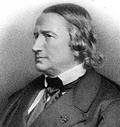Music and Texts of GARY BACHLUND
Vocal Music | Piano | Organ | Chamber Music | Orchestral | Articles and Commentary | Poems and Stories | Miscellany | FAQs
Le Silence - (1991)
Alfred de Vigny
for medium voice and pianoS'il est vrai qu'au jardin sacré des écritures,
le fils de l'homme ait dit ce qu'on voit rapporté;
Muet, aveugle et sourd au cri des créatures,
Si le ciel nous laissa comme un monde avorté.
Le juste opposera le dédain à l'absence
et ne répondra plus que par un froid silence
au silence éternel de la divinité.

Alfred de Vigny
Comte Alfred Victor de Vigny (1797-1863) was a French poet, playwright, and novelist who began a military career the time when the Napoleonic Empire was collapsing but instead he became a poet, publishing his Poémes in 1822. During the Spanish Civil War in 1823, Vigny's regiment was in reserve in the Pyrenees, where he became friends with Victor Hugo, met Alexandre Dumas, and grew to be enthusiastic about new, Romantic winds in the poetry. His translation of Shakespeare's Othello was produced at the Comédie-Française 1829; his others were Romeo and Juliet (1828), The Merchant of Venice which he re-titled Shylock (1829).
Vigny's Chatterton (1835), written for Marie Dorval, his mistress in a stormy liason from 1831 to 1837, is one of the most important and influential plays of the romantic stage. It made him famous and he was considered then to be Victor Hugo's rival in literature. Vigny's poetry was marked by a stoical despair, pessimism, and philosophical, meditative tone. In his lyrics Vigny was more restrained about his inner feelings than his great colleague, Lord Byron, but in his Journal intime Vigny recorded his personal thoughts.
"Silence alone is great; all else in weakness" (from La Mort du Loup, 1864)
Although Vigny had gained success as a writer, the French Academy rejected his candidacy five times, and it was not until 1845 when he was accepted. Vigny's marriage with Lydia Bunburry turned sour, and his liaison between the years 1831 and 1837 with Marie Dorval was stormy. From 1840 he lived a reclusive life in Paris or in Le-Maine-Giraud in his country house, where he took care of his sick wife and his mother. His attempts to enter the political scene failed. Occasionally Vigny published poems in the magazine Revue des Deux Mondes. Vigny died in Paris on September 17, 1863, a few months after his wife. His poetical testament, Les Destineés, appeared in 1864, and Journal d'un Poète in 1867. The unfinished novel, Daphné, was published in 1912.